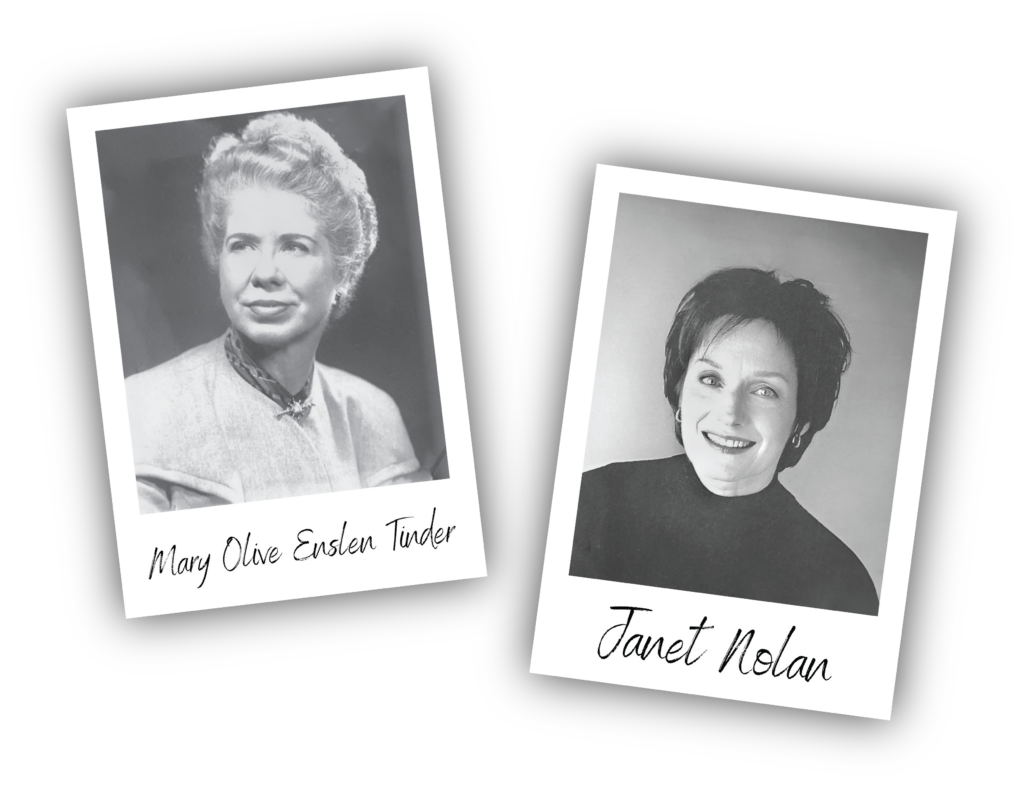
Story: Lisa Sollie
The Alabama Women’s Hall of Fame will induct its two newest members at a ceremony on the University of West Alabama campus on March 7 at 11:00 a.m. at Bridges Auditorium. This year’s inductees are broadcaster Mary Olive Enslen Tinder and artist Janet Nolan.
Widely regarded as the first female broadcaster on the Eastern seaboard, Mary Olive Enslen Tinder made history when she became the first woman to radio broadcast the Indianapolis 500.
Janet Nolan spent her career using the everyday, mundane items tossed on the streets of New York City to make world-renowned installation art, transforming discarded objects into beautiful, unique treasures.
Nolan and Tinder’s inductions into the Alabama Women’s Hall of Fame pay homage to their outstanding contributions to art and communication. The Hall of Fame, relocated in 2021 to the University of West Alabama, is a permanent place of honor for Alabama’s most outstanding women.
The ceremony is open to the public with no cost for admission. Reservations are required for a luncheon to be held afterward at Bell Conference Center. Luncheon tickets are $50.
Born in 1905 in Wetumpka, Alabama, Tinder began her career as a book critic and lecturer until the American Cancer Society asked her to do a book review on Indianapolis radio station WIRE. Her radio spot garnered such remarkable success that the station manager asked her to host it permanently.
After a successful radio career from 1939-51, Tinder was a substitute host for a program on WCOP in Boston. This experience led to an explosive on-camera career at NBC affiliate WJAR-TV in the northeast. Tinder’s talk shows attracted the biggest celebrities, including Tony Curtis, Burl Ives, Joan Crawford, Hildegarde, Alfred Hitchcock, Marlon Brando, Carol Lombard, Merv Griffin, Debra Padgett, Louis Armstrong, and many more. By 1957, “The Olive Enslen-Tinder Show” aired three days a week with 81 percent of the market share. Tinder also appeared in a handful of movies, some with her just-as-famous Kerry Blue dog “Pam.”
Although Tinder began her career as a book critic and lecturer, often highlighting important topics such as the effects of war on literature, her work soon transitioned into radio and television broadcasting, which led to appearances in nearly 40 states and half a dozen countries.
Nolan, born in Montgomery, Alabama, was destined to be an artist after an art assignment as a second grader showed enormous promise. Her talent was displayed again in junior high when Nolan completed a sizeable multi-media assignment in exquisite detail on a city of her choosing, New York City, where she later resided after earning an undergraduate and graduate degree in Fine Arts from Auburn University and Georgia State University, respectively. In NYC, Nolan’s passion for “found art” or discarded items left on the city streets, such as gloves, pieces of plastic, hubcaps, and umbrella skeletons, led to her fashioning remarkable works of art.
Her commissions included works for major universities and hospitals, and her sculptures and drawings were exhibited in galleries and museums in Chicago, Atlanta, Boston, Sun Valley, Mobile, Auburn, and Denver. In New York, the artist donated two reliquaries, whose purpose is to protect and display relics, to the World Trade Center. Also of note is Nolan’s “Nightingale,” created using umbrella skeletons and triangles of fiberglass that soar 57 feet into the top of an atrium, which is a permanent installation in the Francois-Xavier Bagnoud Building on the campus of Harvard University.
Nolan once said, “The theme of redeeming unwanted objects and repurposing them into a new context has been central to my artmaking since the late 70s. Stripping these discarded items of their identity to exploit their material has never been my goal. Rather, I endeavor through my practice to shift the expectation of their function and, in doing so, elevate them from depleted debris to vibrant art.”
The Alabama Women’s Hall of Fame was established in 1970 to honor the lives of outstanding women from the state of Alabama. Inductees must be deceased for two years, be from or affiliated with Alabama, and be selected by unanimous vote of the board of directors of the AWHF. The board comprises a cross-section of the state and represents broad areas of interest.
For more information, email Valerie Burnes, University of West Alabama history professor and the Hall of Fame’s executive secretary, at vburnes@uwa.edu or call (205) 652-3856. The deadline for luncheon reservations is February 28.